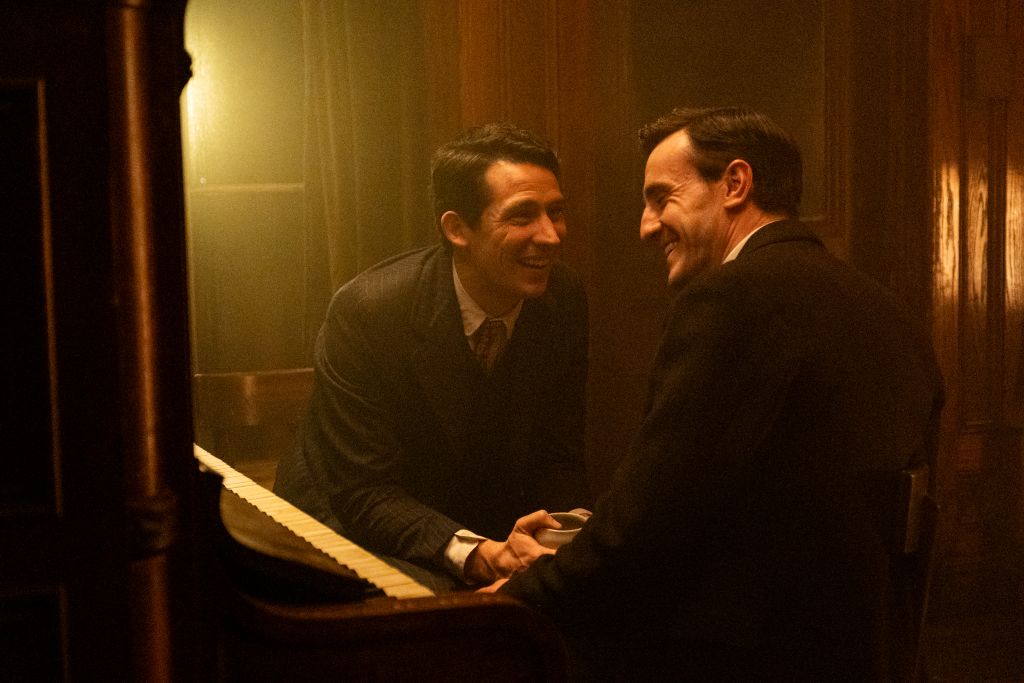Reviews include Marty Supreme, Song Sung Blue, and The Voice of Hind Rajab.
TFCA Friday: Week of Sept. 19
September 19, 2025

Welcome to the TFCA weekly, a round-up of reviews and coverage by members of the Toronto Film Critics Association.
Release this Week!
American Sweatshop (dir. Uta Briesewitz)
“American Sweatshop is an anxiety-soaked story, but it’s not a thriller — it’s smarter than that. Director Uta Briesewitz has created a character study set in a kind of cautionary tale,” says Liz Braun at Original Cin. “Lili Reinhart’s understated performance is what keeps the story intriguing. American Sweatshop falters in its third act, but Reinhart will keep you watching regardless. On the off-chance you didn’t already grasp the toxic nature of the internet, this one’s for you.”
Andrea Bocelli: Because I Believe (dir. Cosima Spender)
“[A] look at his life, through intimate interviews with him, his accomplishments and reflections and his talent. Regarded as one of the world’s greatest singers, with 90 million albums sold and umpteen sold out global live concerts, the doc features archival and new footage, interviews with his intimates and colleagues that only enrich our admiration for the 66-year-old visually impaired Italian tenor,” writes Anne Brodie at What She Said. Soul soothing vocals and new insights make this a worthy couple of hours.”
“Is it time to say goodbye to music docs that feature stars as executive producers?” asks Pat Mullen at POV Magazine. “That question ironically lingers in the serviceable but lacking Andrea Bocelli documentary Because I Believe. Crediting both the famed Italian opera singer and his wife Veronica in e.p. roles, this by the book bio is a handsomely made affair by director Cosima Spender. However, depth or higher meaning aren’t on the agenda here. This film, like so many other music docs in a seemingly endless stream of formulaic but perfectly watchable lightweight works, is all about access and music.”
A Big Bold Beautiful Journey (dir. Kogonada)
“A Big Bold Beautiful Journey truly comes alive through Farrell and Robbie’s performances,” says Rachel West at That Shelf. “While the film follows a familiar romantic trajectory–as the saying goes, it’s not about the destination, but about the journey.”
“I’d blame the somewhat ham-fisted attempt at delivering ‘meaning’ and ‘message’ and ‘romance,’ often in the same moment, and with little regard for the audience’s intelligence,” says Chris Knight at Original Cin. “I mean, check out the needle drop of ‘Let My Love Open the Door’ at a crucial moment in the story. And not the Pete Townshend original but a cover! That’s hardly a bold musical choice.”
“When a movie takes as big of a fantastical punt as A Big Bold Beautiful Journey, it has to be grounded by two people viewers want to see come together in the inevitable heart pounding concluding embrace,” notes Rachel Ho at Exclaim!. “For as talented as Farrell and Robbie are individually, they never click. They lack any chemistry to speak of; even at the all-important meet-cute, they may as well have been long-lost cousins. If we can’t buy into their blossoming relationship, the big, bold, beautiful journey feels inconsequential, and the far-out vibe and tone become laborious to work through.”
“With heart etched firmly on its brightly coloured sleeve, Kogonada’s A Big Bold Beautiful Journey places romantic earnestness and bittersweet heartache in the foreground and throws cynicism and subtlety to the wind. And you know what? I appreciate that,” admits Andrew Parker at The Gate. “In an era where romances are either formulaic to the point of making the viewer feel very little or soap opera tragedies and recycled rom-coms that are taken verbatim from everything that proceeded it in the genre, I’ll always prefer a brazen, heartfelt big swing over something that’s playing things far too safe.”
“Kogonada, whose early films Columbus and After Yang found real poetry in small moments, spins his wheels here,” says Peter Howell at the Toronto Star. “The screenplay by Seth Reiss, fresh off the acidic bite of The Menu, grinds down its life lessons to platitudes as smooth as fast-food containers: convenient, disposable and delivered with all the conviction of an algorithm.”
Compulsion (dir. Neil Marshall)
“Compulsion crawls toward a finale that addresses all questions with predominantly ‘who cares?’ answers,” says Thom Ernst at Original Cin. “Perhaps if Marshall had gotten there sooner, he might have salvaged a passable thriller. Instead, what we’re left with is a Maltese giallo knock-off. Whatever interesting elements surface come too late and are deeply problematic. By the time the narrative decides where it’s going, the audience has already decided not to care. Still, I gotta’ admit, Malta sure looks lovely this time of year.”
Him (dir. Justin Tipping)
“Obviously, there’s more weirdness to the story, which turns out to be a prosaic allegory about selling one’s soul for fame,” says Jim Slotek at Original Cin. “But with hallucinogenic effects and music, Tipping sustains a mood from the opening to the last act that suggests superstardom may be more sinister than we already suspect.”
“Him is neither scary or suspenseful but bloody and violent,” notes Gilbert Seah at Afro Toronto. “The premise of sacrifice for the ultimate gain is simple enough and moves towards a climax with new characters while not making much sense.”
“Him is acted, directed and shot in a style that is deliberately frantic and scary. Over and over again, Cam is told that he has endure and inflict pain or he won’t be the leader. He won’t be the GOAT,” writes Marc Glassman at Classical FM. “It’s clear what Tipping and Peele are up to with the film. Him is intended to be a satire on American values masquerading as a critique on football. But it’s not funny and the targets are so obvious—sexism, drugs, violence, sports as metaphor—that their demolition in the film seems forced and ridiculous.”
The History of Sound (dir. Oliver Hermanus)
“Since The History of Sound debuted at the Cannes film festival last May, it has been measured against Ang Lee’s 20-year-old Brokeback Mountain. Apart from both films having scenes of al fresco sex, this is not a particularly useful comparison,” says Liam Lacey at Original Cin. “Fundamentally, they’re different genres: Brokeback Mountain was a crime story while History is closer to a crypto musical or stealth folk opera. The film’s rewards are more contemplative than dramatic, relying on the subtle expensiveness of the actors, Alexander Dyanan’s painterly cinematography, and the melancholy beauty of the soundtrack, blending traditional songs and orchestral music, expressing the deep emotions the two men hold in check.”
“Hermanus’s film is neatly split asunder between its two passions: folk music and the love of men for each other. Much of The History of Sound aptly reflects the concerns expressed in its title. For clear reasons, the heartbreaking tales of love affairs that have gone wrong touch the souls of Lionel and David,” says Marc Glassman at Classical FM. “You can imagine the two exploring those songs from the rocky shores of Newfoundland to the Appalachian mountains and beyond, to the Rockies and the Pacific Coast. Like Dvorak, Grieg, Janacek, Bartok and others who spent countless hours discovering and transcribing the songs of their cultures, the imagined figure of Lionel Worthing honours the traditions of his country’s past—though he doesn’t become a famous composer.”
“Slowly paced and spanning decades of time, Hermanus’s film is one that values patience and a kind of detached intimacy – it is more about the sentiments and passions left unspoken than it is about any bold declarations,” says Barry Hertz at The Globe and Mail. “At times, the film suffers the same fate that befell Hermanus’s other period work, including the 2022 drama Living (a remake of Akira Kurosawa’s Ikiru) and the 2019 war drama Moffie – both deeply sincere efforts that felt stifled by the director’s rather dusty, fussy visual and narrative sensibilities.”
“The History of Sound might not be the romance some hope for it to be, especially during the admittedly overlong final third, but that doesn’t mean that Hermanus misses the intended mark,” says Andrew Parker at The Gate. “Not all romances need to be hot and heavy to have a greater meaning, and the bond shared between these two men is detailed and beguiling in its own unique way. It’s a constant smoulder rather than a slow burn, but that’s just how life is sometimes.”
“The first act of The History of Sound serves a thing of beauty as Hermanus delicately observes the cadence of working class life and the gradual development of romance. The film finds a laudably progressive depiction of a queer love story, especially one set in 1917, with no whispers or speculation. It’s a courtship treated like any other,” says Pat Mullen at That Shelf. “The idyllic Appalachian setting offers a refreshingly masculine twist. There’s a rugged tenderness to the story that develops. Hermanus also avoids melodrama, eschewing any romantic crescendos. This love story favours a mellow tune, confidently and comfortably told with restraint. Natural light adds to the mannered, politely reserved way of American life in which Lionel and David find themselves. It’s a story of self-possessed, unemotional verve that quietly catches a viewer in its undertow.”
Just Breathe (dir. Paul P. Pompa II)
“Just Breathe is entertaining enough as a low-budget film for undemanding audiences,” says Gilbert Seah at Afro Toronto. “The difficulty of rooting for such a choleric protagonist who is self-destructive and uncontrollable is another flaw in a film where it is generally the case that a protagonist is a likable one.”
Megadoc (dir. Mike Figgis)
“Megadoc is extremely ‘inside’ – we learn about endless hours waiting for things to happen, the scene, the light, plus the flashes of narcissism, entitlement, moods, while waiting for all the departments to do what they need to do,” says Anne Brodie at What She Said. “I’ve been on a few and yup. Dull, long, unremarkable – not the doc, the life on the set.”
Night of the Reaper (dir. Brandon Christensen)
“Christensen has crafted up an old-school slasher throwback with a solid hook, a great Final Girl, and a story that unfolds at a good clip that doesn’t overstay its welcome,” notes Joe Lipsett at Bloody Disgusting.
Same Day with Someone (dir. Rangsima Aukkarawiwat and Yanyong Kuruangkura)
“The film is not that interesting for a time loop film, unable to reach the heights of Groundhog Day or any of the other time loop films,” writes Gilbert Seah at Afro Toronto. “It does not help that the main character, Mesa, is totally annoying, getting what she wants half the time. Giggling or sulking, Mesa is one spoilt child, to put it mildly.”
Scared Shitless (dir. Vivieno Caldinelli)
“The budget, rumoured to be modest, shows no signs of hampering the production. If anything, the limitations forced smarter decisions,” observes Thom Ernst at Original Cin. “The monster, a many-tentacled sewage-dweller, is convincing enough to be threatening, but silly enough to let audiences enjoy the lunacy. Nothing looks cheap; everything looks intentional. It’s the kind of resourcefulness that makes low-budget Canadian filmmaking so easy to root for.”
She Said Maybe (dir. Buket Alakus and Ngo The Chau)
“The rom com is light ok entertaining with lots of scenic sights of Istanbul,” says Gilbert Seah at Afro Toronto. “This is a rich couple that spends time mostly on yachts and in expensive restaurants, where the reality of the ordinary folk is totally ignored. Throw caution to the wind to enjoy this one.”
Swiped (dir. Rachel Lee Goldenberg)
“Wolfe quickly learned the true nature of the male dominated tech industry. She was forced to leave and sued; she had a dream to create a female friendly, non nudity dating app based on kindness and that became Bumble, and Bumble BFF, proving her value to the industry and becoming the youngest female tech billionaire in the US,” notes Anne Brodie at What She Said. “But a Forbes article, written by a woman, based on conversations with the men at Tinder and none with Wolfe heaped abuse and shamed her. Out of the blue, a Russian entrepreneur well versed in her public challenges comes forward to ask that she become his CEO. Much more lies ahead, twists and turns, and fresh wounds but she carries on, a warrior. A deflating portrait of an industry that needs to improve, of sexism and of being strong when you feel your weakest.”
“Swiped may not have anything revolutionary to say, but it’s an effective and entertaining watch thanks to Lily James’ performance,” says Rachel West at the Alliance of Women Film Journalists.
“Goldenberg and co-writers Bill Parker and Kim Caramele never decide where to put their emphasis. Do they want their story to be about the building of a brand, a woman overcoming the odds, or a more interesting story about workplace discrimination and frat boy culture in the tech industry?” asks Andrew Parker at The Gate. “Swiped also can’t discern if it wants to be a serious drama, a wacky workplace comedy, or a heady satire, meaning viewers are often given emotional whiplash. One moment, Whitney could be dealing with some hard and depressing shit, only to have some kid randomly and apropos of nothing haul off and punch a guy in the nuts seconds later. For most of Swiped, I was completely unsure what type of movie this was supposed to be outside of a biopic that’s in such a hurry to hit all of its beats that it forgot how to assemble everything into a usable package.”
File Under Miscellaneous
At Zoomer, Brian D. Johnson chats with the members of Spinal Tap about their big reunion: “You’ve covered rock ’n’ roll. So you’ve read about other groups. They split up, they come back, they punch each other. They don’t punch each other, they don’t come back. It’s all the same thing. We just have issues with…” Nigel says before David interjects: “People.” There’s also a video! (see above)
At The Globe and Mail, Barry Hertz remembers Robert Redford: “He was your best friend, your ally, your defender, your co-conspirator in a virtuous battle against impossible evil foes. He was everything that you felt America’s best and brightest should embody – the shining light in the darkened space of a theatre, and the even darker space of a country that could feel increasingly hostile to those who believed in the dream that the country had long represented.”
At Zoomer, Brian D. Johnson looks back at the career and impact of Robert Redford: “As a romantic lead, Redford served as an object of desire for a succession of formidable heroines, such as Jane Fonda in Barefoot in the Park (1967), Barbra Streisand in The Way We Were (1973) and Meryl Streep in Out of Africa (1985). He may not have been God’s gift to women, but he played sensitive, charming men who know how to listen. And among the tributes after his death, some of the most rapturous words came from Fonda, Streisand and Streep. ‘I can’t stop crying,’ said Fonda, who made four movies with Redford. ‘He meant a lot to me and was a beautiful person in every way. He stood for an America we have to keep fighting for.’ Streisand called him ‘charismatic, intelligent, intense, always interesting – one of the finest actors ever.’ For Streep, he was ‘a lovely friend … one of the great lions has passed.'”
A Festival of Festival Coverage: Closing Out TIFFty
ICYMI: we polled members for their “best of the fest” picks with Hamnet coming out on top! Plus photos from our annual Critical Drinking bash.
At the Toronto Star, Peter Howell picks the best of the fest, including Hamnet: “A film of whispers and symbols, magic and anguish, drawn by Chloé Zhao from Shakespearean legend, Maggie O’Farrell’s celebrated novel and astute observations of life. Jessie Buckley and Paul Mescal head a strong cast as Agnes and William, who are as volcanic in love as they are in grief. Jacobi Jupe is terrific as Hamnet, the young son whose tragic loss unleashes torrents but also art. Max Richter’s score is one of the year’s best, empathetic and engaging. Altogether magnificent.”
At The Globe and Mail, Barry Hertz reports from the hiccup-laden TIFF awards/closing ceremony: “Typically, TIFF’s awards ceremony acts as a collective sigh of relief for the festival faithful – a low-key, congratulatory acknowledgement that we all managed to come out the other end of 11 days of cinema, celebrity and streetcar-closures intact,” says Hertz. “Instead, we got mimosas with a side of over-easy anxiety, with everyone – from all possible perspectives – quietly marvelling to themselves at how TIFF managed to keep stepping on rake after rake it had itself laid down. But such was the overall vibe of this year’s festival – plenty to celebrate, just as much to worry about.”
At Exclaim!, Rachel Ho picks TIFFty favourites including EPiC: Elvis Presley in Concert: “Runner-up for the People’s Choice Documentary Award, Elvis Presley in Concert brought crowds onto their feet dancing and cheering as if it were the ’70s and the man himself was shaking, rattling and rolling in Toronto once again,” says Ho. “Beyond the electricity and talent oozing off the screen, Baz Luhrmann’s concert film adds another feather in the cap of Peter Jackson’s Park Road Post with a monumental restoration effort. A lot of documentaries and movies have been made endlessly discussing the singer’s exploits, it’s a refreshing treat to simply have Elvis up on screen doing what he did best without interruption.”
At Afro Toronto, Gilbert Seah picks the best films of the festival, including The Secret Agent: “Director Filho keeps his audience guessing most of the time about what is happening. There is always a sense of intrigue and mystery from the film’s start when the hero, Marcelo, is driving through a gas station in which a deadman has been shot and covered with a blanket just outside the vicinity of the station at the film’s start to two sudden thugs suddenly appear out of the blue in pursuit of Marcelo.” He also has 80 capsule reviews from the festival.
At RogerEbert.com, Jason Gorber reflects on the festival, including the controversy over The Road Between Us: “Of course, the fact that this film went on to win the big prize does nothing to decalcify already entrenched views on the matter,” says Gorber. “Yet whatever your politics, it’s a time to encourage bravery from festivals to showcase differing views, provided they come from an honest place of exchange rather than blind hatred, and to encourage those to take chances on experiencing perspectives far outside one’s own in order to broaden their horizons and at least engage honestly, no matter one’s proclivities.” And at the German The Spot, Gorber reports on TIFF in one, two, and three parts.
At POV Magazine, Pat Mullen reports on the documentary side of TIFF: “The documentaries were great this year at the Toronto International Film Festival, so it’s a shame that a lesser entry in the TIFF Docs slate completely overwhelmed the conversation,” notes Mullen. “For example, too few words were said in praise of The Tale of Silyan, Tamara Kotevska’s standout in the TIFF Docs programme. This beautiful film, which North Macedonia submitted for Best International Feature and should bring Kotevska back to the Oscars à la Honeyland, finds a striking fable for the global migration crisis in the story of a farmer, Nikola, whose struggle to generate enough revenue from his crops is intimately linked to the fates of storks that populate the region. The film poetically weaves a folktale about a young man who flew the coop and became estranged from his family.
TV Talk/Series Stuff
At What She Said, Anne Brodie cracks open House of Guinness: “The modern rock score adds a certain tang to the proceedings and reminds us human nature ‘twas ever thus.”
At Original Cin, Karen Gordon reports on Black Rabbit: “Black Rabbit has a tremendous cast, and there will likely be break out actors in this series. But the best known actors, Law, Bateman and Kotsur are riveting. If the last time you saw Kotsur was as the charming father in CODA, for which he won an Oscar, then wait until you see him play an unrelenting heavy here.”



